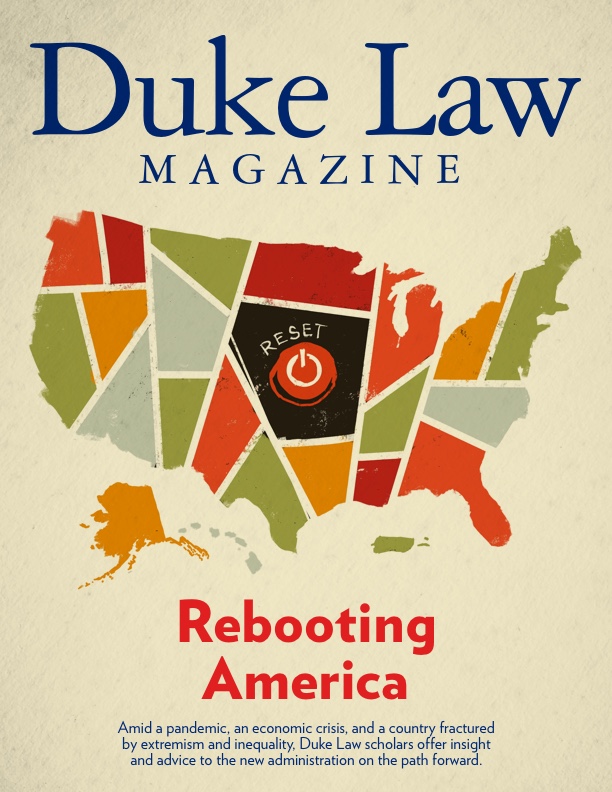
Constitutional Law | Neil Siegel
Revive and fortify constitutional norms

Reviving constitutional norms is both one of the most important things that needs to be done and also one of the most difficult things to do. Constitutional norms are norms that serve constitutional purposes, like sustaining American democracy by respecting the will of the voters. Donald Trump did about as much as one president could do to degrade the status of constitutional norms.
But while I view Trump as an important cause of norm degradation in recent years, he’s ultimately more of an effect than a cause. I tie the degradation of constitutional norms to a long-term racial realignment between the political parties. The Democrats started to become more racially liberal back in the late 1930s and early ’40s; the Republican party started becoming more racially conservative at roughly the same time; and the racial realignment went national with passage of the Civil Rights Act of 1964 and the Voting Rights Act of 1965. The two political parties have never been able to sustain a robust repertoire of constitutional norms when they’ve been divided over race — and they’re very much divided over race today, even though there are other important contributors to our democratic dysfunction.
It’s these larger forces that explain why the Republican base chose Trump over less norm-defying Republican candidates and why they love him. Trump didn’t choose the base in 2016.
Even so, Trump has made matters significantly worse. Among (too many) other things, he sought to steal a presidential election by lying repeatedly about the outcome, possibly soliciting election fraud in Georgia, pressuring the vice president to exercise powers that he does not possess, and successfully encouraging political violence directed at a coordinate branch of government. He has weakened bedrock norms that seek to maintain the American experiment with democracy, and it is disturbing to consider how many Republican politicians went along with him. Still, it wasn’t primarily Democrats who stopped him. The norms held this time in significant part because key Republican state election officials and Republican-appointed judges stood up and said, “No.” But I don’t think the story here is that our constitutional democracy was tested and survived. I think it is that Trump has exposed just how vulnerable the system is. It’s like we crash-landed a plane.
Law schools should view it as part of their mission to teach and debate the constitutional norms that apply to elected officials — not just law and not just courts.
Now that Trump has provided a road map, what will happen the next time that a politician tries to steal a free and fair democratic election? Who will be installed as election officials, members of certification boards, governors, state judges, and federal judges, and how hyper-partisan and anti-democratic will they be? I fear that the future may be a whole lot worse.
Thus, it’s extraordinarily important to try to rehabilitate norms to the extent possible and to codify some of them. But it’s also extremely difficult given the racial politics of the current era. The political right mostly views norms as an impediment to winning elections and accomplishing partisan objectives like appointing conservative Justices. And the political left too is becoming less norm-sensitive, as illustrated by increasing talk of packing the Supreme Court.
It’s important to bring attention to the issue, but again one needs to be circumspect about what can be accomplished. The Biden administration can do things to rehabilitate norms unilaterally, but that doesn’t mean the next Republican administration is going to follow suit. Norms require both parties to buy in. It might be possible to codify a requirement that presidential candidates release their tax returns and refrain from engaging in certain conflicts of interest, and perhaps even protecting whistleblower and inspectors general. That could help in the short term. But none of these measures are risk-free politically, and you can’t codify a norm against lying that would apply to the president. President Biden needs not only to model behavior that comports and promotes constitutional norms, but also to speak about why they matter. Of course, given media polarization, the people who most need to hear the message may be the least likely to receive it. But one does the best that one can.
Legal education matters, as well as civic education more broadly. Law schools should view it as part of their mission to teach and debate the constitutional norms that apply to elected officials — not just law and not just courts. And people of good faith and good will should insist that certain basic values of honesty, democracy, decency, public service, anti-corruption, etc., are not and cannot be made to become partisan issues, even though there is no doubt that there are real partisan disagreements about them, and many people will code them that way.
Will we continue to have something resembling a democracy or will we descend into de-facto authoritarianism, in which those in power can steal elections and entrench themselves in power? When we do talk about these things — whether as legal scholars, political scientists, civics teachers, or concerned citizens — it’s going to be important to insist that this is not a partisan issue and we are in serious danger as a country if we view it that way.

